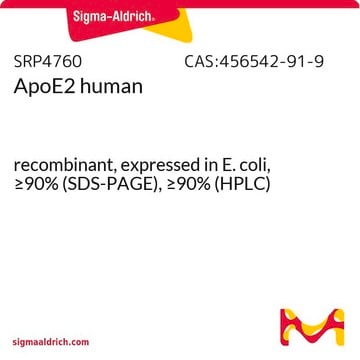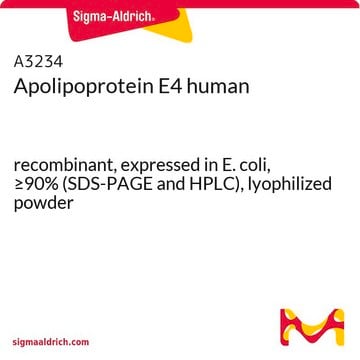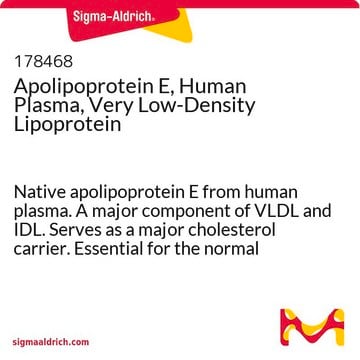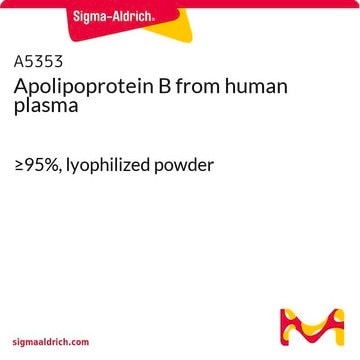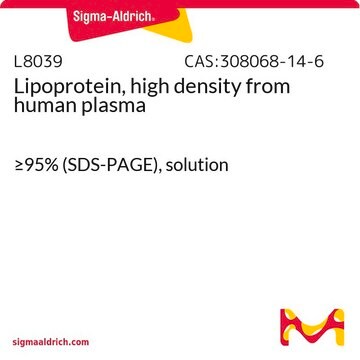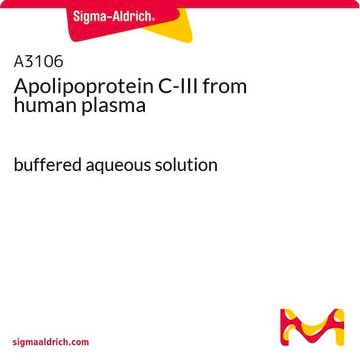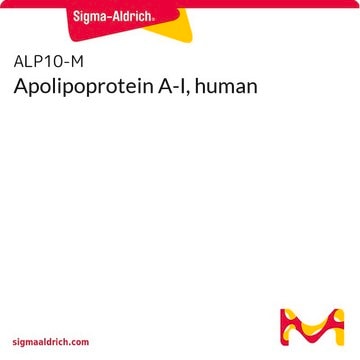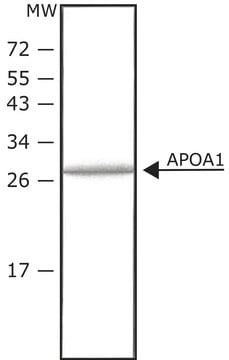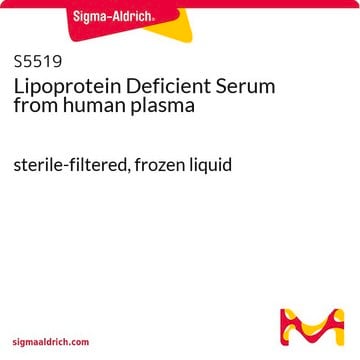SRP6303
Apolipoprotein E from human plasma
≥95% (SDS-PAGE)
Synonyme(s) :
ApoE
Se connecterpour consulter vos tarifs contractuels et ceux de votre entreprise/organisme
About This Item
Code UNSPSC :
12352202
Nomenclature NACRES :
NA.32
Produits recommandés
Description générale
Apolipoprotein E (ApoE) is an important constituent of all plasma lipoproteins. The concentration of Apo E in normal plasma is 5 mg/100mL. Significant quantities of ApoE are produced in liver and brain and to some extent in almost every organ. It exists in three major isoforms; E2, E3, and E4, which differ from one another by a single amino-acid substitution. The gene encoding this protein is localized on human chromosome 19q13.32.
Actions biochimiques/physiologiques
Apolipoprotein E (ApoE) serves as a ligand for low density receptors and participates in the transport and redistribution of cholesterol and other lipids. Other functions include immunoregulation, cell growth modulation and differentiation. Apo E is thought to be involved in tissue repair as increased amounts of the protein are found at sites of peripheral nerve injury and regeneration. A mutant form is associated with familial type III hyperlipoproteinemia. In addition to facilitating solubilization of lipids, these proteins help to maintain the structural integrity of lipoproteins, serve as ligands for lipoprotein receptors, and regulate the activity of enzymes involved in lipid metabolism. ApoE′s interaction with specific ApoE receptor enables uptake of chylomicron remnants by liver cells, which is an essential step during normal lipid metabolism. It also binds with the low-density lipoprotein (LDL) receptor (apo B/E).
Forme physique
Frozen in 50 mM NH4HCO3, pH 8.0.
Code de la classe de stockage
11 - Combustible Solids
Classe de danger pour l'eau (WGK)
WGK 3
Point d'éclair (°F)
Not applicable
Point d'éclair (°C)
Not applicable
Certificats d'analyse (COA)
Recherchez un Certificats d'analyse (COA) en saisissant le numéro de lot du produit. Les numéros de lot figurent sur l'étiquette du produit après les mots "Lot" ou "Batch".
Déjà en possession de ce produit ?
Retrouvez la documentation relative aux produits que vous avez récemment achetés dans la Bibliothèque de documents.
Les clients ont également consulté
Apolipoprotein E isoforms and lipoprotein metabolism.
Phillips MC
IUBMB Life, 66(9), 616-623 (2014)
Apolipoprotein E-low density lipoprotein receptor binding: study of protein-protein interaction in rationally selected docked complexes.
Prevost M and Raussens V
Proteins: Structure, Function, and Genetics, 55(4), 874-884 (2004)
Genome-wide association study identifies a single major locus contributing to survival into old age; the APOE locus revisited.
Deelen J
Aging Cell, 10(4), 686-698 (2011)
Pathogenesis of type III hyperlipoproteinemia (dysbetalipoproteinemia). Questions, quandaries, and paradoxes.
Mahley RW
Journal of Lipid Research, 40(11), 1933-1949 (1999)
Karol Kaiser et al.
Nature communications, 10(1), 1498-1498 (2019-04-04)
WNTs are lipid-modified proteins that control multiple functions in development and disease via short- and long-range signaling. However, it is unclear how these hydrophobic molecules spread over long distances in the mammalian brain. Here we show that WNT5A is produced
Notre équipe de scientifiques dispose d'une expérience dans tous les secteurs de la recherche, notamment en sciences de la vie, science des matériaux, synthèse chimique, chromatographie, analyse et dans de nombreux autres domaines..
Contacter notre Service technique